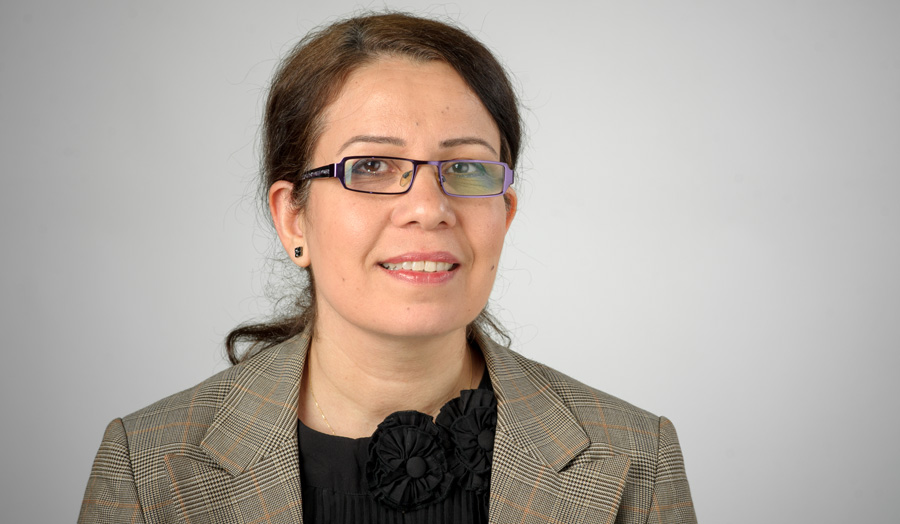Dr Samireh Jorfi is a Senior Lecturer in Biosciences for the School of Human Sciences. She is the course leader for Biomedical Science MSc and Blood Science MSc. Her research background is in studying viral infections and cancer drug resistance. Dr Jorfi teaches students in the bioscience subject areas at undergraduate and postgraduate level. She also supervises research students during their BSc, MSc and PhD degrees.

Dr Samireh Jorfi
Dr Jorfi started her research and teaching career at London Met in 2009. She graduated with first-class honors in Biomedical Science – BSc (Hons) from London Metropolitan University in 2008. She gained her postgraduate certificate in Biomedical Science in 2009 and completed her PhD studies at London Met in 2013. Dr Jorfi has an MA in Learning and Teaching in Higher Education (2020).
Dr Jorfi research is focused on viral infectious disease, cancer drug resistance, and microplastics. She investigates the role of extracellular vesicles in the disease mechanisms. Dr Jorfi has been a member of the Cellular and Molecular Immunology Research Centre at London Met since 2009.
Dr Jorfi teaches at all levels in Biosciences. She is module leader for wide range of modules at the School of Human Sciences. She leads and teaches Anatomy and Physiology modules (BC4004, CY4004,DT4004 and NU4004), Tissue Science (BC5003), Introduction to Cellular Pathology (BM7104DL), Introduction to Anatomy and Physiology in Health and Disease (BM7110DL) and Introduction to Cell Biology (BM7111DL). She also teaches Systems Pathology (BC6051), Advanced Immunology (BM7004) and Advanced Tissue and Infection Science.
- MA: Learning and Teaching in Higher Education, London Metropolitan University (2017-2020)
- PhD: London Metropolitan University, CMIR, "Thesis: The Role of Microvesicles in Cancer and Viral Infection" (2009-2012)
- BSc Honours (1st class), Biomedical Science, London Metropolitan University (2007-2009)
- Jorfi S, Ansa-Addo EA, Mariniello K, Warde P, Bin Senian AA, Stratton D, Bax BE, Levene M, Lange S, Inal JM. A Coxsackievirus B1-mediated nonlytic Extracellular Vesicle-to-cell mechanism of virus transmission and its possible control through modulation of EV release. J Gen Virol. 2023 Sep;104(9). doi: 10.1099/jgv.0.001884. PMID: 37665326.
- Antwi-Baffour S, Malibha-Pinchbeck M, Stratton D, Jorfi S, Lange S, Inal J.(2019) Plasma mEV levels in Ghanain malaria patients with low parasitaemia are higher than those of healthy controls, raising the potential for parasite markers in mEVs as diagnostic targets. J Extracell Vesicles. 2019;9(1):1697124. Published 2019 Dec 18. doi:10.1080/20013078.2019.1697124.
- Jorfi S, Ansa-Addo EA, Kholia S, Stratton D, Valley S, Lange S, Inal J. (2015) Inhibition of microvesiculation sensitizes prostate cancer cells to chemotherapy and reduces docetaxel dose required to limit tumor growth in vivo. Sci Rep. 2015 Aug 25;5:13006. doi: 10.1038/srep13006.
- Kholia S, Jorfi S, Thompson PR, Causey CP, Nicholas AP, Inal JM, Lange S.(2015) A novel role for peptidylarginine deiminases in microvesicle release reveals therapeutic potential of PAD inhibition in sensitizing prostate cancer cells to chemotherapy. J Extracell Vesicles. 2015 Jun 19;4:26192. doi: 10.3402/jev.v4.26192. eCollection 2015.
- Stratton,D., Lange,S., Kholia, S., Jorfi,S., and Inal, J.M (2014). Label-free real-time acoustic sensing of microvesicle release from prostate cancer (PC3) cells using a Quartz Crystal Microbalance. Biochem Biophys Res Commu. pii: S0006-291X(14)01775-6. doi: 10.1016/j.bbrc.2014.09.132.
- Jorfi, S., Ansa-Addo, E.A. , Kholia, S., Stratton,D., Lange,S., and Inal, J.M (2014). Inhibition of microvesiculation sensitizes prostate cancer cells to chemotherapy and reduces docetaxel dose required to limit tumor growth in a xenograft mouse model of prostate cancer. (Under revesion)
- Jorfi, S., Ansa-Addo, E.A. and Inal, J.M (2014). CVB1-induction of apoptotic MVs reveals a nonlytic MV-to-cell mechanism of virus transmission to new cells. (Submitted).
- Jorfi,S., and Inal, J.M (2013). Coxsackievirus B transmission and possible new roles for extracellular vesicles. Biochem Soc Trans. 1;41(1):299-302. doi: 10.1042/BST20120272.
- Jorfi,S., and Inal, J.M (2013). The role of microvesicles in cancer progression and drug resistance, Biochem Soc Trans. 1;41(1):293-8. doi: 10.1042/BST20120273.
- Stratton,D., Lange,S., Williams,G., Jorfi,S., Antwi-Baffour,S., Kosgodage,U.and Inal,J.M (2013). Microvesicles released constitutively and upon stimulation retain parental features but exhibit distinct properties. (Under revision)
- Grant, R., Ansa-Addo, E., Stratton, D., Antwi-Baffour, S., Jorfi, S., Kholia, S., Krige, L., Lange, S., INAL, J.M. (2011) A filtration-based protocol to isolate Plasma Membrane-derived Vesicles and exosomes from blood plasma J. Immunol Methods. 371,143.
- Inal, J.M., Ansa-Addo, E., Stratton, D., Kholia, S., Antwi-Baffour, S., Jorfi, S. and Lange, S. (2010) Microvesicles in health and disease. Arch. Immunol., Ther. Exp. 60.
- First prize for the best poster, The role of microvesiculation in determining the sensitivity of cancer cells to chemotherapeutic drugs. Presented at Microvesiculation and disease Biochemical Society, 13th-14th September 2012
- First prize, 3rd Postgraduate research Students Symposium (2012). British Society of Immunology (BSI) Trainee Abstract Award (2010)
